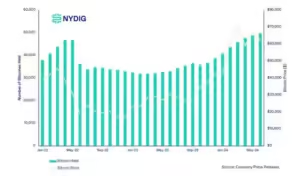U.S. Spot Bitcoin ETFs Face $140 Million in Outflows Amidst Continued Fund Exits

QUICK TAKE:
- U.S. spot bitcoin ETFs experienced $139.88 million in net outflows on Thursday.
- This marks the fifth consecutive day of outflows for these funds.
- Grayscale’s GBTC and Fidelity’s FBTC were the top funds affected.
- BlackRock’s IBIT was the only ETF with net inflows.
The U.S. spot bitcoin exchange-traded funds (ETFs) have encountered a significant wave of withdrawals, marking the fifth straight day of net outflows. On Thursday, these funds collectively saw $139.88 million move out, highlighting ongoing investor caution within the cryptocurrency market.
Major ETFs Hit Hard
Grayscale’s Bitcoin Trust (GBTC) led the downturn with a substantial daily net outflow of $53 million. Fidelity’s Bitcoin ETF (FBTC) closely followed, reporting $51 million in outflows. Other significant withdrawals were noted in Bitwise’s Bitcoin Fund (BITB), which lost $32 million, and VanEck’s Bitcoin ETF, with $4 million in outflows. The fund managed by Invesco and Galaxy Digital recorded $2 million in outflows.
BlackRock’s IBIT Stands Out
Amidst the widespread outflows, BlackRock’s iShares Bitcoin Trust (IBIT) emerged as the sole fund to record net inflows, attracting $1 million. IBIT also saw substantial trading activity, with a daily trade volume of $565 million on Thursday. Other funds, including those from Ark Invest, Valkyrie, Franklin Templeton, WisdomTree, and Hashdex, saw no inflows or outflows, indicating a period of stagnation for these funds.
Market Activity and Historical Context
The total trading volume for these ETFs was $1.16 billion on Thursday, reflecting a decrease from Tuesday’s $1.7 billion. Since their launch in January, the 11 spot bitcoin funds have accumulated a total net inflow of $14.67 billion as of Thursday, underscoring their initial popularity despite recent outflows.
The cryptocurrency market’s volatility was further evidenced by the price of bitcoin, which dropped 1% in the past 24 hours to $64,471 at the time of writing, according to The Block’s bitcoin price page.
Global ETF Developments
In a related development, Australia’s largest stock exchange, ASX, listed its first spot bitcoin ETF on Thursday. The VanEck Bitcoin ETF operates as a feeder fund, providing bitcoin exposure by investing in the U.S.-listed VanEck Bitcoin Trust (HODL). This move signifies ASX’s efforts to align with the crypto ETF momentum observed in the U.S. and Hong Kong, where such financial instruments have gained traction since 2022.
Future Outlook for U.S. Spot Ether ETFs
While U.S. bitcoin ETFs face challenges, the spotlight is also shifting towards the launch of the country’s first batch of spot ether funds. Two sources revealed that ETF issuers have received feedback from the Securities and Exchange Commission (SEC) regarding their S-1 forms for ether ETFs. These issuers are now working to submit the amended forms by Friday, signaling potential new developments in the ETF space.
Implications of Continued Outflows
The sustained outflows from U.S. spot bitcoin ETFs suggest a cautious sentiment among investors, possibly driven by broader market uncertainties and regulatory developments. The significant withdrawals from major funds like Grayscale’s GBTC and Fidelity’s FBTC highlight a shift in investor confidence, which could impact the overall stability and attractiveness of bitcoin ETFs.
Regulatory Environment
The ongoing regulatory scrutiny by the SEC and other agencies plays a crucial role in shaping investor sentiment. The SEC’s stringent oversight and recent feedback on ether ETF proposals indicate a regulatory landscape that is both evolving and increasingly rigorous. This environment may deter some investors while encouraging others to seek clarity and stability through regulatory compliance.
Conclusion
The recent wave of outflows from U.S. spot bitcoin ETFs underscores a period of heightened caution and strategic repositioning within the cryptocurrency investment space. While prominent funds face significant withdrawals, BlackRock’s IBIT stands out with net inflows, suggesting selective investor confidence. The global expansion of bitcoin ETFs, as seen with ASX’s new listing, and the anticipated launch of U.S. spot ether funds indicate an evolving market landscape. As regulatory bodies like the SEC continue to shape the environment, investors and issuers alike must navigate these changes to harness the potential of cryptocurrency ETFs.



